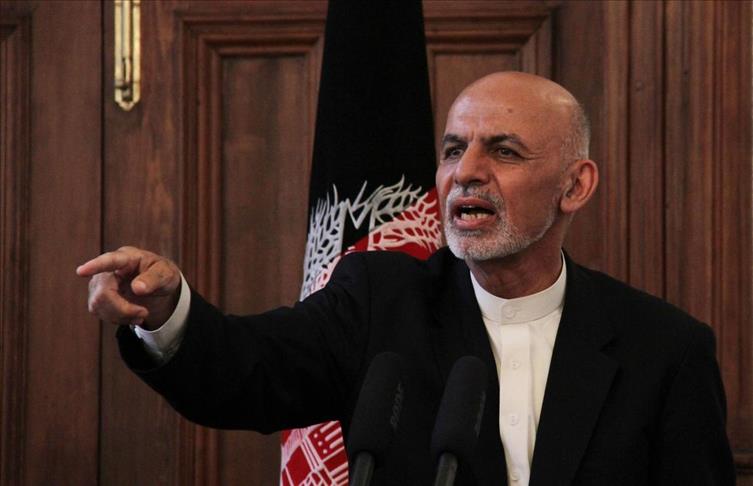
By Shadi Khan Saif
KABUL
Afghanistan's parliament has not given President Ashraf Ghani an easy ride since he took office last September.
On Wednesday, they rejected Anisa Rassouli, his choice for the Supreme Court bench and the first ever female candidate. Days earlier they rejected, for the second time, his chosen defense minister, leaving the crucial position unfilled even as the country goes through the peak of the fighting season with the Taliban. Most of his original cabinet were earlier rejected.
The deep-seated tussle for power has left Ghani's capacity to govern limited but it is one he will have to continue to contend with, while also balancing the sensitivities of his unity government partners, in order to finally complete his cabinet.
Atta Muhammad Noor, the powerful Governor of northern Balkh province, seemingly crossed the limits of his authority this week by proposing his own list of candidates to head the Ministry of Defense.
Noor is among the key leaders of the powerful Jamiat-e-Islami party that enjoyed sweeping influence across Afghanistan after the fall of Taliban. Jamiat’s fighters and leaders, mostly ethnic Tajiks, are still in commanding positions in various posts.
Though members in both houses of the Afghan parliament, the lower house Wolesi Jirga and the upper Masharano Jirga, have not been elected on the basis of party lines, they do often vote in blocs -- some of which are not endeared by Ghani.
As a former World Bank economist, Ghani is a relatively fresh face on the Afghan political scene, where many were directly involved in expelling the Soviet invasion in the 1980s and subsequent civil wars.
“Atta Noor and his party is not the only strong and parallel force in Afghanistan,” Dawood Shah Mal, a senior parliamentary reporter, told Anadolu Agency. “There are so many groups formed on regional, ethnic and party lines in the parliament that keep their own priorities superior to national interests and can force the government into accepting their terms.”
The Wolesi Jirga's deputy speaker Zahir Qadir, for example, heads a group of over 50, from a total of 249 MPs, who vote at his command, Mal noted. Zahir's Abdul Qadir was a former commander in the anti-Soviet Mujahideen militia and an influential figure in Afghanistan’s ethnic Pashtun-dominated east.
“His group members told me they voted No while voting for designate-minister for defense Masoom Stanikzai just because the group decided that way,” said Mal.
Outside of the parliament, Jamiat leaders and other former Mujahideen commanders who remained in power until Ghani took charge have accused the Afghan president of sidelining them.
The Jamiat was particularly angered by Ghani’s latest pick for the defense ministry, Stanikzai, who they hold responsible for the death of their founding leader Burhanuddin Rabbani.
Rabbani was killed four years ago by a suicide attacker disguised as a Taliban messenger. The attacker was taken to Rabbani’s residence for talks by Stanikzai, who was then serving as the head of a peace negotiation committee and was himself severely injured in the attack.
On the eve of the vote for Stanikzai, Noor refreshed the allegations and voiced his annoyance at Stanikzai's nomination.
“Noor just does not act as a governor, he rather sees himself as an emperor of the North,” said Ramazan Bashardost, an independent MP known for defending human rights and attacking corruption.
“Afghanistan would not be peaceful and prosperous for a hundred years as long as we keep undermining the rule of law,” said Bashardost. He has stopped attending parliament sessions after its legitimate term ended, though Ghani has allowed it to continue until new elections are held.
“First, the Russians were blamed for invading then Burhanuddin Rabbani said his government was toppled by Taliban with the support of Pakistan, then Taliban said the U.S. toppled them and so on... we need to stop looking to outside forces and should rather fortify our own institutions,” he said.
Fahim Siddiqui, President of youth activist organization Khat Naw, said he believed having more young leaders could change the dynamic of Afghan politics, which could be aided by the existing requirement of a university degree to run for parliament.
“I hope the future parliament would not be divided on ethnic, political and regional lines,” he said. “Our elder politicians are more into their legacies and pursue their own agendas but the youngsters are seeking a change and want to make a mark."
Anadolu Agency website contains only a portion of the news stories offered to subscribers in the AA News Broadcasting System (HAS), and in summarized form. Please contact us for subscription options.

